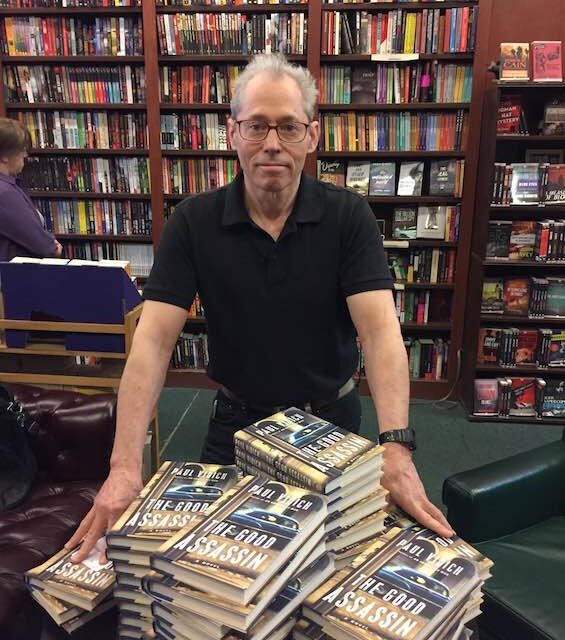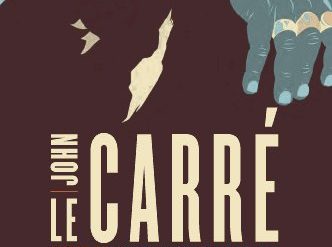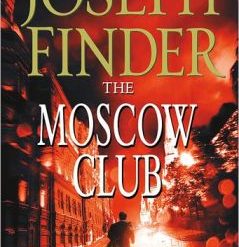
Even if you’re a fan of espionage fiction, you may not yet be familiar with the name Paul Vidich. You should be. Vidich writes great spy novels in the grand tradition of Eric Ambler, Graham Greene, and John le Carré. His historical espionage tales rank with those of his better-known contemporaries, Alan Furst and Joseph Kanon. He possesses a rare talent for repopulating history with complex and credible characters, a talent that’s fully on display in the six spy novels he’s published as of 2023. (A seventh is underway.)
Estimated reading time: 10 minutes
A major new voice in the genre
Over the past half-dozen years, Paul Vidich has emerged as a major new voice in the genre. Each of the novels he has published to date is solidly grounded in verifiable historical facts. A mole hunt in the CIA during the paranoid years of the Red Scare. A CIA operation in Cuba the year before its Revolution. The death of a CIA scientist during Project MKUltra, the Agency’s experiment with LSD. A KGB defector during the final months before Mikhail Gorbachev took the helm of the Soviet Union. In his fifth novel, The Matchmaker, a tense, brilliantly plotted venture into the divided city of Berlin in the weeks before the Wall came down. And in the seventh, Beirut Station: Two Lives of a Spy, a desperate joint US-Israeli operation to kill a master terrorist during the Israeli invasion of Lebanon.
This post was updated on October 10, 2023.
The historical models of his characters
In an in-depth interview online, “How Paul Vidich builds his world of spies” by Peter Handel (CrimeReads, October 5, 2023), Vidich speaks about the sources of these stories. “I usually do six months of research,.” he notes “The research helps me find an incident, or character, or conflict interesting enough to support a novel. Five of my books emerged from historical figures that I came across: Markus Wolf, the Stasi head of counterintelligence; William Morgan, soldier of fortune executed by Castro; James Kronthal, aide to Allen Dulles, who committed suicide to save the agency from the embarrassment of his Soviet betrayal; Frank Olson, a murdered bioweapons scientist; and Imad Mughniyeh in my new novel, Beirut Station.”
Writing great spy novels as a second career
As Vidich reveals on his author website, he worked “in music and media at Time Warner, AOL, and Warner Music Group” prior to turning to writing. At Warner, “he was Executive Vice President in charge of global digital strategy. He was a member of the National Academies committee on The Impact of Copyright Policy on Innovation in the Digital Era and testified in Washington before rate hearings. He presently serves as an independent board director, angel investor, and advisor to Internet media companies in video and music.
“Vidich is a graduate of Wesleyan University where he was a Trustee and received a Distinguished Alumni Award, and The Wharton School, University of Pennsylvania. He serves on the boards of directors of Poets and Writers, The New School for Social Research, and the Elizabeth Kostova Foundation.” Vidich lives in Manhattan.
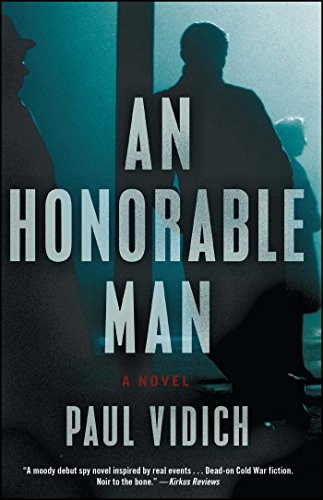
An Honorable Man – George Mueller #1 (2016) 289 pages ★★★★☆ – The Cold War, the early CIA, and the McCarthy Era
Half a century ago we learned from John le Carré about amorality and corruption in the world of espionage. Other authors have written thousands of books about spies since then. Some, including Alan Furst, Charles Cumming, Olen Steinhauer, Dame Stella Rimington, and Joseph Kanon, for example, have made their own estimable contributions to the genre in recent decades. But only rarely has their work brought to light the sheer ugliness of the espionage craft and what damage it wreaks on those who practice it. However, there is an exception. In his first novel, An Honorable Man (2016), Paul Vidich brings to life a veteran officer in the early CIA who is honorable only in an ironic sense. The world he inhabits, and the life he lives, are fraught with dreadful expectations and impossible choices.
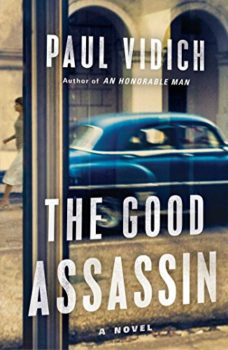
The Good Assassin – George Mueller #2 (2017) 269 pages ★★★★☆ – A compelling spy novel set during the Cuban Revolution
In Vidich’s captivating second novel, The Good Assassin, George Mueller has been retired from the agency for five years. He is teaching Shakespeare at his alma mater, Yale University, when the director of the CIA approaches him to take on an assignment in Cuba. There, he is to track down an old acquaintance, Toby Graham. The director seems to suspect that Toby may not be following orders. Mueller is to find out “what’s on his mind.”
The action unfolds in the closing weeks of 1958, as the Cuban Revolution is heading toward its climax on New Year’s Day, 1959. Traveling under cover as a travel writer for Holiday magazine, Mueller circulates through Havana with a freelance photographer in tow. She is an attractive young woman with whom, unsurprisingly, he ends up in bed. And it turns out that she is friendly with a married American couple, the Malones, who have purchased land for a cattle ranch nearby.
Mueller knows them both: he and Jack Malone both attended Yale, as did Toby Graham. And Jack’s unhappy wife, Liz, had once slept with Mueller. The four—Mueller, Jack, Liz, and Katie Laurent, the photographer—wind up spending a great deal of time together with Graham as Liz and Jack’s marriage steadily disintegrates. The five are drawn closer together by the civil war spiraling out of control all around them.

The Coldest Warrior (2020) 222 pages ★★★★★ – Project MK-Ultra and the scientist who fell to his death
On November 28, 1953, an American scientist named Frank Olson who had been working on biological weapons for the US Army “fell or jumped” to his death from the thirteenth floor of a New York City hotel. Paul Vidich imagines what might really have happened that day in The Coldest Warrior. The story unfolds twenty-two years later as both the US Senate and the CIA undertake investigations into the Agency’s notorious Project MK-Ultra on “human behavior modification,” which administered LSD to Olson and others without their knowledge or consent.
After an introductory chapter set in 1953 in the hotel where “Dr. Charles Wilson” (Frank Olson) dies, the scene shifts to 1975 at a hearing in the United States Senate exploring that death. During that period, all the chickens were coming home to roost for the CIA. Its many crimes — assassinating foreign leaders, overthrowing governments, corrupting labor and student groups, and Project MK-Ultra — were coming to light in an orgy of recriminations.
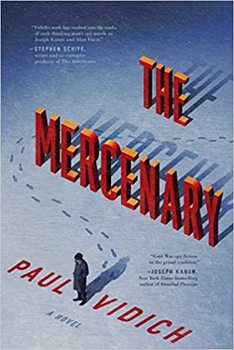
The Mercenary – George Mueller #3 (2021) 274 pages ★★★★★ – A superb Cold War thriller
It’s 1985. The “mercenary” of the title is Aleksander Garin, a former CIA officer who had been forced to leave the Agency six years earlier. The high-ranking KGB agent he was attempting to exfiltrate from the Soviet Union was captured and executed then. Since then, Garin has been working on contract from time to time. Suddenly, the CIA calls unexpectedly with a generous offer inviting him to return to Moscow to “handle” a senior KGB officer code-named Gambit. The agent’s handler, George Mueller, the CIA Station Chief in the city, had been blown and expelled from the country. Now Gambit was demanding to meet with Garin personally.
Once in Moscow, Garin initiates the perilous process of meeting with Gambit and negotiating a safe course through the distrustful staff of the CIA station. On all sides, his failure six years earlier returns to complicate his life. And Gambit has access to some of the KGB’s most closely held secrets, so the stakes couldn’t be higher. However, the price he sets to deliver those secrets reawakens Garin’s deepest fears. He must engineer Gambit’s exfiltration along with his wife and son—a feat the CIA has never managed to accomplish. And to complicate further an already daunting challenge, Garin is falling in love with a woman he stumbled across at a rendezvous with Gambit.

The Matchmaker: A Spy in Berlin by Paul Vidich (2022) 250 pages ★★★★★ – A dangerous spy game in Berlin before the fall of the Wall
It’s 1989. Anne Simpson works as an interpreter for the US Army in occupied West Berlin. Her husband is an East German man, a piano-tuner who travels extensively throughout the region on call to temperamental musicians. But Stefan Kroehler is also an agent of East Germany’s Stasi. To Anne’s mounting horror, that truth begins to eke out when James Cooper turns up from the American Embassy to inform her that Stefan has gone missing. The police are dragging the Landwehr Canal between the Soviet and American sectors in search of his body.
While the search for Stefan’s body proceeds, Anne is introduced to the architecture of the German police services. Two men interrogate her, one from the Bundesnachrichtendienst (BND), West Germany’s intelligence service, the other from the BKA, the domestic police. Both suspect her of hiding a secret about Stefan. Although the Americans and the West Germans seem convinced Stefan is dead, the East Germans are not persuaded. And the CIA seeks to use the Stasi’s determination to locate Stefan as a way to lure Rudolf Kruger, the Stasi’s number two, into a trap for their own hidden reasons. Anne now comes under pressure from both sides—and she discovers she can trust no one in her increasingly fraught search for her wayward husband.

Beirut Station: Two Lives of a Spy by Paul Vidich (2023) 352 pages ★★★★★—A compelling spy novel about living a double life
We all have secrets. . . Secrets are a part of our lives and the lives of literature’s great characters. But spies operate in a more complex world of secrets—things they hide from family, from friends, and from themselves. I found the double lives of spies as a compelling premise to explore.” And that, as the author, Paul Vidich, told an interviewer online, is the subtext of his extraordinary latest novel, Beirut Station, about living a double life. And if the author’s comment isn’t enough to make that clear, the book’s subtitle drives the point home: Two Lives of a Spy.
The spy at the heart of Vidich’s novel is a young Lebanese-American woman who goes by the name Analise Hahn Assad. “Analise’s Georgetown graduate degree and her father’s agency connections had opened the door for her career in the agency,” Vidich writes, “and she had made her way in the Directorate of Operations by pushing herself harder than her male colleagues and by putting up with unwanted advances.” Now she is a CIA officer working under Non-Official Cover in Beirut in a job with the United Nations High Commissioner for Refugees (UNHCR).
For related reading
You might also enjoy my posts:
- The 15 best espionage novels
- Good nonfiction books about espionage
- The best spy novelists writing today
If you read spy thrillers, consider dipping into the work of these other excellent authors:
- Joseph Kanon’s spy thrillers are superb
- Charles Cumming’s first-rate spy thrillers
- Following Mick Herron’s clever British spies at Slough House
- Dame Stella Rimington’s Liz Carlyle series of top-notch espionage novels
- The evocative Night Soldiers series from Alan Furst
- The spellbinding thrillers of Robert Harris
- Top-notch spy novels from Alex Gerlis
- The 12 novels of Alex Berenson’s thrilling John Wells spy series
And you can always find my most popular reviews, and the most recent ones, on the Home Page.

